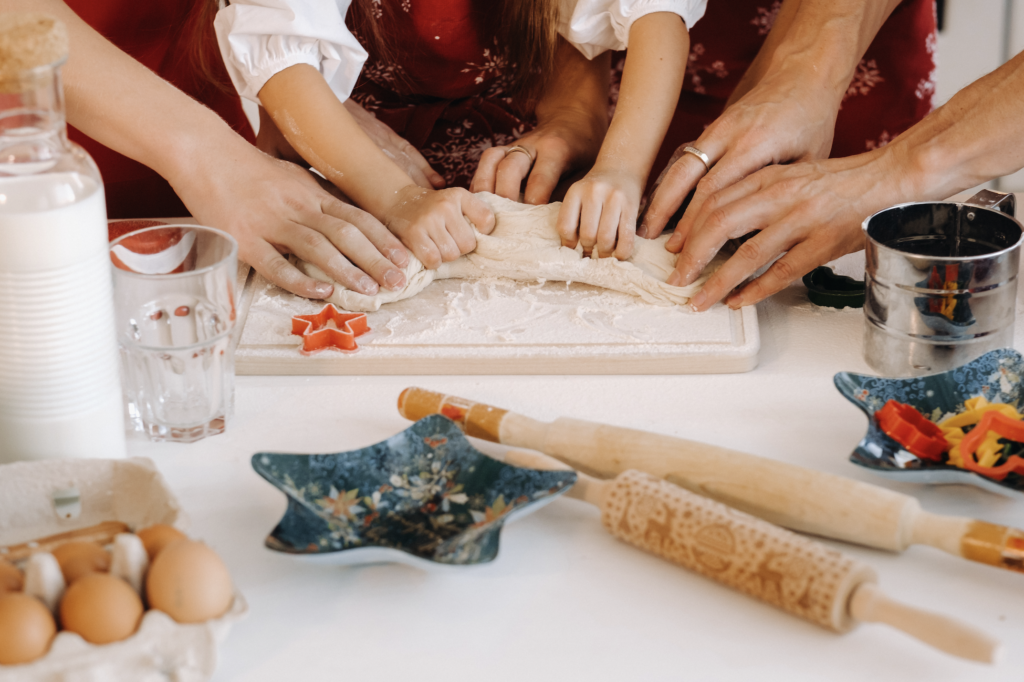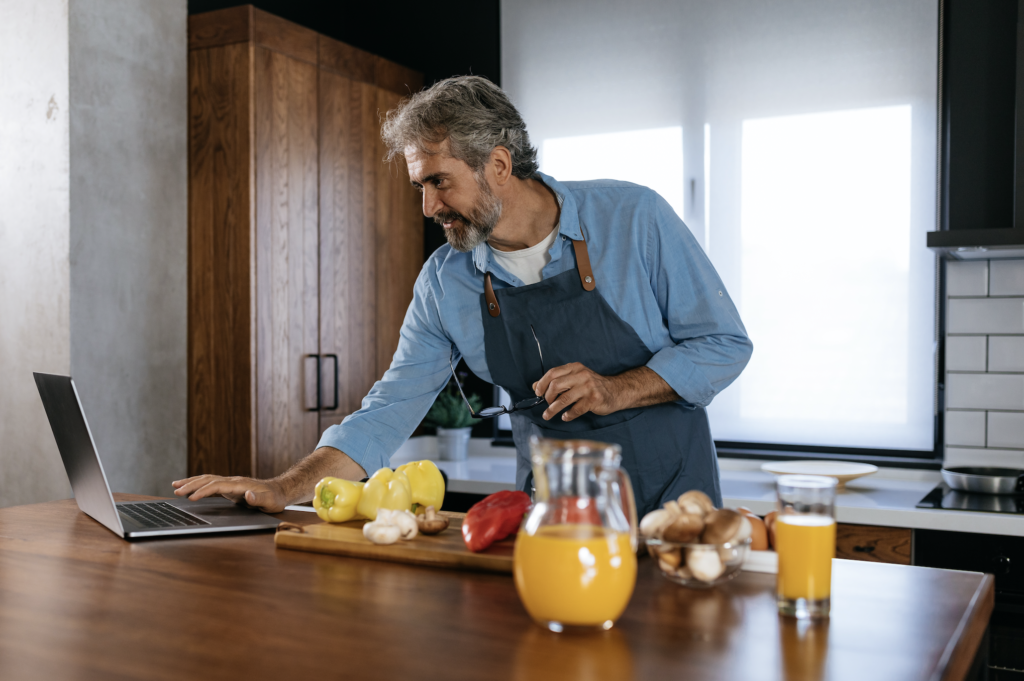
Cooking at home หรือ การทำอาหารทานกันเองที่บ้าน มีประโยชน์ด้านดีต่อสุขภาพจิตของเราเอง และ อาจจะรวมไปถึงคนในครอบครัวได้อีกด้วย เพราะการทำอาหารทานเองถือเป็นวิธีการหนึ่งของกิจกรรมบำบัดที่สามารถช่วยเราลดความเครียดที่เกิดจาการทำงานหรือการดำเนินชีวิตได้
เหล่ามนุษย์ออฟฟิศที่เข้างานแต่เช้าเลิกงานตอนมืดค่ำ เป็นกลุ่มลูกค้าประจำของร้านแกงถุงตามตลาดหรือร้านอาหารตามสั่งแถวที่พักอาศัยอย่างหลีกเลี่ยงไม่ได้ เพราะแค่ลำพังแค่แบกสังขารกลับบ้านก็เหนื่อยมากแล้ว จะให้แวะตลาดเพื่อซื้อของมาทำเมนูที่อยากกินหรือเพื่อให้สุขภาพร่างกายที่ดีตามหลักโภชนาการที่เลือกสรรเองได้ ก็เป็นเรื่องที่ดูแล้วจะเหนื่อยเกินไป
แม้มนุษย์ออฟฟิศอย่างเราๆ ต่างก็รู้ว่าการทำอาหารกินเองนั้นมีประโยชน์หลายด้าน เช่นเราสามารถเลือกวัตถุดิบที่ดีที่ช่วยในเรื่องสุขภาพร่างกายให้แข็งแรงได้ หรือ การทำอาหารกินเองก็ลดความเสี่ยงในเรื่องของการปนเปื้อนสารอันตรายต่างๆ ได้ แต่ก็ยังมีอีกหลายคนที่มองว่าการทำอาหารทานเองเป็นเรื่องไม่จำเป็น ซึ่งความจริงแล้วน้อยคนจะรู้ว่าการทำอาหารไม่ใช่แค่ดีต่อร่างกายเท่านั้นแต่ยังดีต่อจิตใจด้วย และ หากวางแผนดีๆ ในระยะกลางและยาวการทำอาหารทานเองก็จะช่วยประหยัดเงินได้อีกด้วยเมื่อเทียบกับการซื้ออาหารมาทานเอง
“พวกเราบางคนชอบมัน และพวกเราบางคนเกลียดมัน”
การทำอาหารเป็นเหมือนงานอดิเรกที่คุณจะพบว่าบางคนหลงใหลในการทำถึงขั้นศึกษาสูตรด้วยตัวเองอย่างจริงจัง บางคนสามารถทำเมนูยากๆ ได้โดยการศึกษาผ่านหนังสือสอนทำอาหารหรือในอินเทอร์เน็ต ในขณะที่บางคนลงความเป็นว่าขอเป็นเพียงเป็นคนกิน ดีกว่าเพราะไม่อยากเอาตัวเองไปเสี่ยงกับน้ำมันกระเด็น ควันโขมงจนต้องสระผม ฉุนจนจามตอนที่ใครสักคนกำลังทำผัดกะเพรา หรือต้องเอามือจับเนื้อสัตว์ที่กลิ่นคาวคลุ้งขึ้นจมูก เป็นต้น
“ไม่ว่าคุณจะยืนอยู่ด้านไหน การทำอาหารก็ได้รับการพิสูจน์ทางการแพทย์แล้วว่ามีส่วนช่วยพัฒนาสุขภาพจิตของเรา”
อาหารบางชนิดสามารถกระตุ้นการทำงานของสมองได้ จากการศึกษาในปี 2014 แสดงให้เห็นถึงความเชื่อโยงระหว่างสุขภาพจิตที่ไม่ดีกับอาหารที่ไม่ดีต่อสุขภาพ ในทางกลับกันหากเรามีการรับประทานที่เหมาะสมโดยปราศจากอาหารแปรรูป จะส่งผลดีต่อความจำของมนุษย์และพัฒนาการทำงานของระบบประสาท ยกตัวอย่างเช่น อาหารที่เน้นไขมันดีอย่าง น้ำมันมะกอก ผลไม้ ผัก ธัญพืชเต็มเมล็ด ปลา และเนื้อแดง เป็นต้น แต่อย่างไรก็ตาม “ก็ต้องยอมรับว่าอาหารที่ไม่ดีต่อสุขภาพนั้นมีรอบตัวเราเต็มไปหมด และก็ต้องยอมรับอีกว่าการเข้าถึงและความยากจนบีบให้คนไม่มีทางเลือก”
“อาหารช่วยสร้างสังคม”
อาหารมีไว้เพื่อแบ่งปัน การทำอาหารเป็นข้ออ้างง่ายๆ หากคุณต้องการสร้างมิตร หรือ สร้างชุมชนขนาดย่อมขึ้นมา มันง่ายพอๆ กับการตีตลาดของเกษตรกรและพูดคุยกับพ่อค้าแม่ค้าร้านอาหารตามสั่ง บางคนก็ทำเพื่อขอสูตรอาหารกันเลย คุณสามารถดึงใครสักคนแถวบ้านมาเพื่อมาร่วมโต๊ะอาหารเย็นด้วยกันได้ หรือการหยิบขนมปังที่คุณหัดทำไปให้เพื่อนข้างบ้านชิม ทั้งหมดนั้นคุณอาจจะทำเพราะคุณอยากมีเพื่อนกินข้าว หรือ อยากทำความรู้จักใครสักคนนึง หรืออยากรู้ว่าขนมปังคุณดีหรือยัง? แต่มันเป็นข้ออ้างในทางอ้อมเพื่อให้คุณได้สร้างสังคมหรือมีปฏิสัมพันธ์กับผู้อื่นได้ด้วยเช่นกัน

“สร้างความนับถือในตัวเอง ผ่านการทำอาหาร”
เมื่อสุขภาพจิตของเราถูกความทุกข์ทรมานเล่นงาน ไม่ว่าจะมาจากงาน ความรัก หรือครอบครัวก็ตาม เราจะรู้สึกว่าถึงความทรมานที่เรากำลังประสบอยู่ และสมองของเราจะเริ่มทำงานผิดปกติเมื่อเราเกิดความรู้สึกเช่นนั้นขึ้น ความคิดนั้นมักทำให้เราเชื่อว่าเราไม่สามารถทำอะไรให้ถูกต้องได้เลยสักอย่าง แน่นอนว่าในตอนนั้นคุณจะสูญเสียความมั่นใจ เชื่อมั่น และความศรัทธาที่มีต่อตัวเองไปเรื่อยๆ
“แม้แต่การทำพาสต้า ก็ช่วยเพิ่มความมั่นใจให้คุณได้”
การทำสูตรอาหารที่คุณหวังว่ามันจะออกมาสมบูรณ์แบบสามารถช่วยส่งเสริมความมั่นใจและความนับถือที่คุณมีต่อตัวคุณเองได้อย่างมาก แม้ว่าจะเป็นเมนูง่ายๆ อย่างพาสต้า ที่มีส่วนผสมแค่ 3 อย่างคือ เส้น เนย และชีสพาร์เมซาน แค่นี้คุณก็ได้พาสต้าแสนอร่อยมากินได้แล้ว Cooking at home หรือ การทำอาหารทานกันเองที่บ้าน ได้รับการพิสูจน์ทางการแพทย์แล้วว่าช่วยเพิ่มความมั่นใจได้อย่างมาก นี่เป็นเพราะความรู้สึกในการสร้างสิ่งที่จับต้องได้ซึ่งผู้อื่นสามารถเพลิดเพลินไปกับผลงานของคุณได้อีกด้วย ซึ่งนั่นเป็นสิ่งที่น่าพอใจมาก

“การทำอาหารสามารถเป็นกิจกรรมบำบัดในรูปแบบกิจวัตรประจำวันได้”
กิจวัตรประจำวันเป็นประโยชน์ต่อสมองของเรามากจนมีรูปแบบของจิตบำบัดที่ทำเป็นกิจวัตรเกิดขึ้นมากมาย การบำบัดด้วยจังหวะระหว่างบุคคลและทางสังคม (IPSRT – Interpersonal and Social Rhythm Therapy) เป็นรูปแบบหนึ่งของจิตบำบัดที่ใช้บ่อยที่สุดกับผู้ที่เป็นโรคอารมณ์แปรปรวนสองขั้ว (BD – Bipolar Disorder) เป็นการรักษาเสถียรภาพการหยุดชะงักของจังหวะชีวิตที่พบได้บ่อย โดยใช้หลักการจากจิตบำบัดระหว่างบุคคลการรักษาภาวะซึมเศร้าตามหลักฐานและเน้นความสำคัญของกิจวัตรประจำวัน
จังหวะการเต้นของหัวใจคือนาฬิกาภายในร่างกายของเรา ที่ควบคุมฮอร์โมนความเครียดและเมลาโทนิน ซึ่งเป็นฮอร์โมนที่ควบคุมวงจรการนอนหลับและตื่นของเรา การทำอาหารสามารถกลายเป็นเสาหลัก ในกิจวัตรประจำวันของคุณที่จะส่งผลให้สุขภาพโดยรวมของคุณดีขึ้น
เหตุการณ์ในชีวิตที่ตึงเครียดและการเปลี่ยนแปลงในกิจวัตรประจำวันของคนๆ หนึ่งสามารถกระตุ้นปัญหาสุขภาพจิตได้อย่างไร ในกรณีของโรคอารมณ์สองขั้ว มันสามารถนำไปสู่การเริ่มมีอาการซึมเศร้าได้เช่นกัน การบำบัดประเภทนี้แนะนำให้ผู้คนกำหนดตารางเวลาเมื่อพวกเขาเข้านอน ตื่นนอน และรับประทานอาหารท่ามกลางกิจกรรมประจำวันอื่นๆ ในการปฏิบัติตามกิจวัตรจะทำให้จังหวะชีวิตของเราเกิดความสมดุลยิ่งขึ้น
“การทำอาหารช่วยเพิ่มความคิดสร้างสรรค์”
ผลการศึกษาเมื่อเร็วๆนี้ระบุว่าการผสมผสานกิจกรรมสร้างสรรค์เข้ากับชีวิตประจำวันของคุณสามารถช่วยเพิ่มอารมณ์และความเป็นอยู่โดยรวมได้อย่างมีนัยสำคัญ การทำอาหารเป็นกิจกรรมที่สร้างสรรค์ที่เน้นให้เห็นถึงความเชื่อมโยงระหว่างการทำอาหารกับการยกระดับอารมณ์ ดังนั้นจึงไม่สามารถปฏิเสธวิทยาศาสตร์ในข้อนี้ได้เลย

แล้วเราจะเริ่มต้นเรื่องนี้ได้อย่างไร? เมื่ออ่านมาถึงส่วนนี้แม้คุณจะเป็นคนที่ไม่ชอบทำอาหารเอาเสียเลย คุณอาจจะเริ่มคิดว่าบางทีมันอาจจะไม่ได้แย่ขนาดนั้น ถ้าจะลองทำดูสักครั้งก็คงไม่เสียหายแถมยังช่วยส่งเสริมสุขภาพจิตของคุณอีกด้วย ในเมื่อคุณสนใจแล้วคุณอาจจะสงสัยว่าคุณจะเริ่มจากตรงไหนก่อนดี รายการต่อไปนี้จะเป็นจุดเริ่มต้นให้กับคุณ
- ทบทวนว่าอาหารโปรดของคุณมีอะไรบ้าง? : บางทีคุณอาจชอบอาหารที่รู้สึกกลัวอย่างที่สุดที่จะลองทำเอง เช่น ซูชิหรือเนื้อสันใน คุณยังสามารถใช้ความชอบตรงนั้นเป็นหลักว่าคุณอาจชอบรสชาติแบบไหน? ตัวอย่างเช่น คุณอาจลองอบปลาแซลมอนในเตาอบ หรือทำเบอร์เกอร์ง่ายๆในกระทะ เป็นต้น
- พิจารณาลองลงเรียนทำอาหาร : คุณอาจจะลองเอาตัวเองไปอยู่ใกล้กับคนที่เข้าครัวแล้วเหมือนกัน เขาอาจจะทำมาก่อนคุณสักเล็กน้อย ซึ่งอาจช่วยให้ประสบการณ์การทำอาหารครั้งนี้รู้สึกเครียดน้อยลง หากคุณรู้สึกประหม่าที่จะไปคนเดียวให้หาเพื่อนมาร่วมด้วย
- เข้าถึงวงในของคุณ : การขอให้คนที่คุณรักแสดงเคล็ดลับและกลเม็ดเล็กๆ น้อยๆ ในการเตรียมอาหารของคุณอาจเป็นวิธีที่สะดวกสบายในการเริ่มต้น นอกจากนี้ยังมีปฏิสัมพันธ์ทางสังคมที่อาจรู้สึกปลอบใจคุณได้ในช่วงเวลาที่ท้าทายด้วย
บทสรุป
ไม่ว่าคุณจะเลือกเริ่มต้นอย่างไร? อย่าปล่อยให้ความกลัวหรือการขาดความมั่นใจมาคุกคามคุณ
Cooking at home หรือ การทำอาหารทานกันเองที่บ้าน เป็นการทำอาหารด้วยตัวคุณเองที่ไม่ได้ยากอย่างที่คุณคิด คุณมีรสชาติที่ชอบ ที่อยากลิ้มรสอยู่แล้ว เพราะฉะนั้นจับรสชาติไหน เมนูนั้น และหน้าตาอาหารจานนั้นไว้เป็นหลัก ลองลงมือทำตามความชอบ ปล่อยใจให้สบายโดยไม่ต้องคิดถึงผลลัพธ์ว่าจะอร่อยหรือไม่ หากคุณสบายใจและรู้สึกสนุกไปกับมัน ต่อให้ลิ้นบอกไม่อร่อย แต่สุขภาพจิตคุณอร่อยไปกับมันแน่นอน
“การสวมหมวกเชฟและสำรวจห้องครัวอย่างกล้าหาญ จะทำให้คุณรู้สึกดีขึ้นกว่าที่เคยอย่างคาดไม่ถึง”
Reference:
Mental Health Benefits of Cooking Your Own Meals
บทความแนะนำ:
Forest Bathing – ให้ธรรมชาติเยียวยาร่างกายของเราด้วยการ “อาบป่า”
ความคิดสร้างสรรค์ สร้างได้และช่วยพัฒนาความสัมพันธ์ในที่ทำงานได้ด้วย MAGIC





